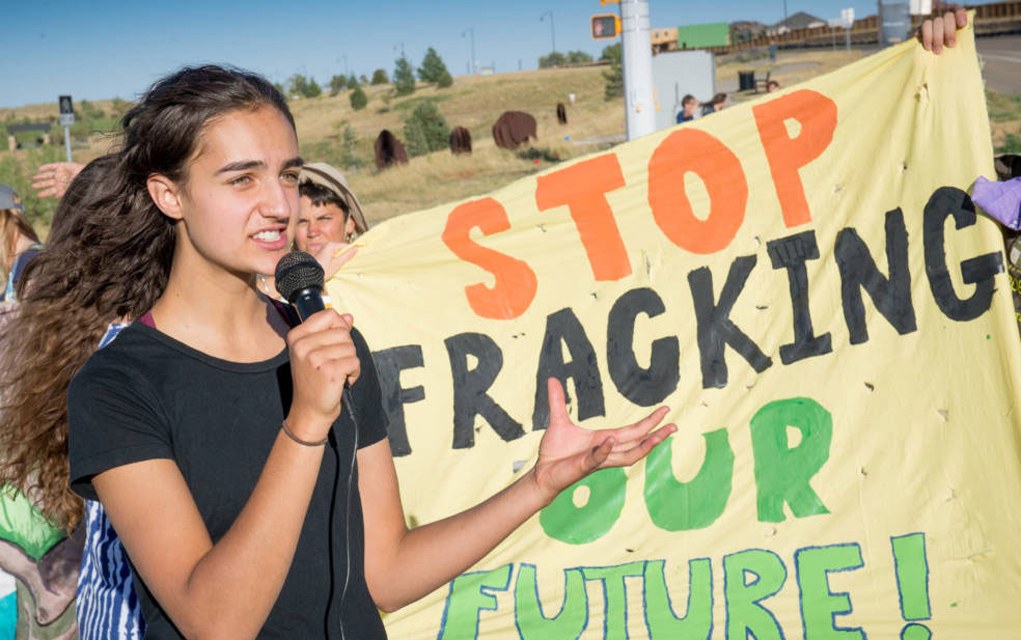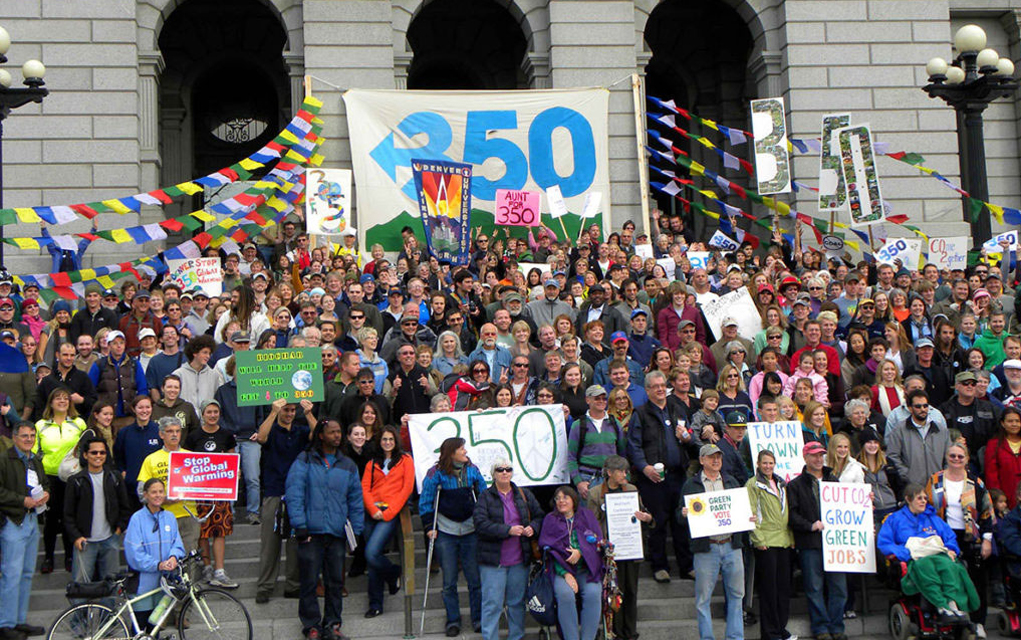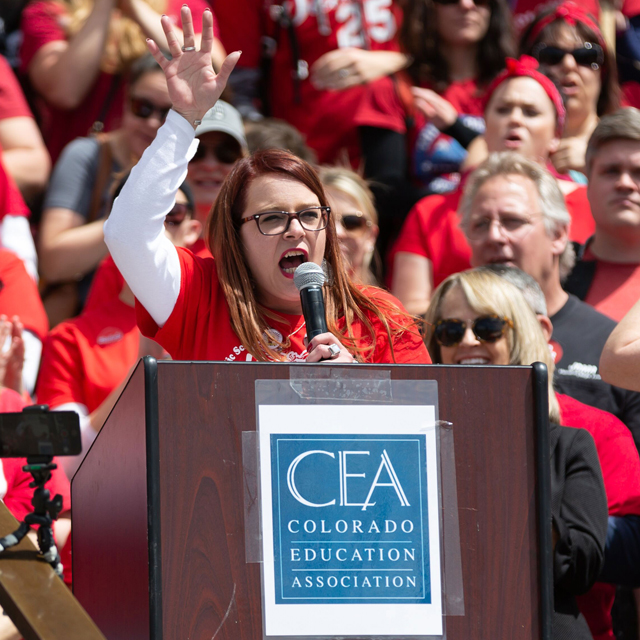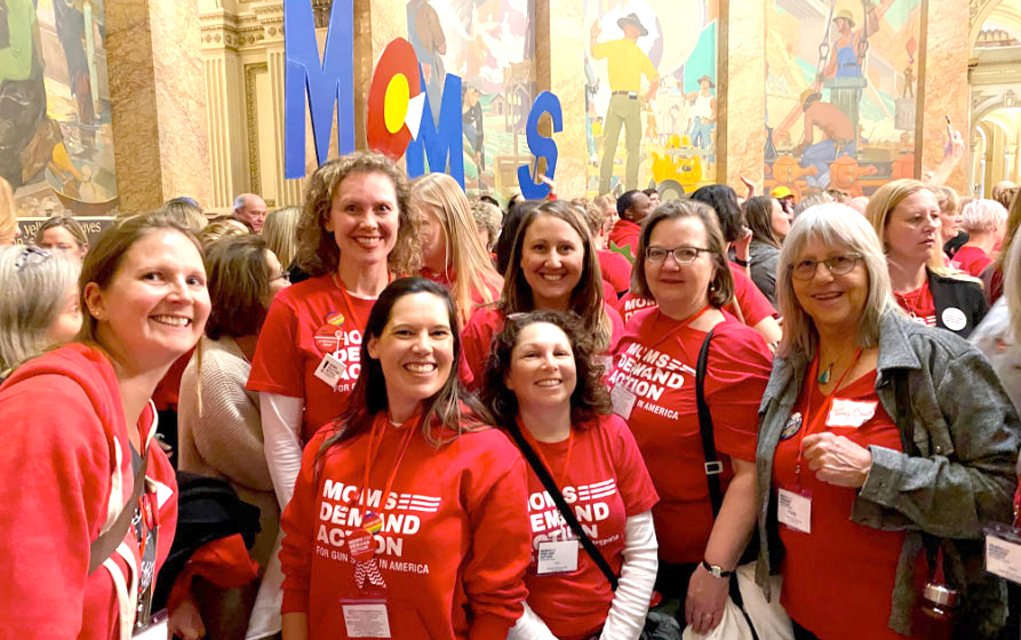
Boulder County is a hotbed of political and social activism. From the Rocky Flats Truth Force protests of the 1970s and ’80s to the 4/20 rallies at the University of Colorado a decade ago to the anti-fracking fight of recent years, community organizing is a long-held institution in these parts.
In the last several weeks, however, large gatherings have been banned and statewide stay-at-home orders have gone into effect in the wake of the coronavirus pandemic. But that’s not stopping organizers from continuing to draw attention to the issues. As the world changes around them, activists adapt.
Homeless advocacy groups from around the state have joined together, asking the courts to intervene and ensure that the Colorado Department of Public Health and the Environment (CDPHE) protect the homeless community from COVID-19. Activists have been rallying outside the immigration detention center in Aurora from their cars, honking their horns and demanding the release of detainees. Environmental groups are still sounding the alarm over climate change and figuring out how to celebrate the 50th anniversary of Earth Day on April 22.
At the same time, many understand how overwhelming and stressful this time is, so most groups are prioritizing connections as they adjust plans, hoping people draw on the strength of their community in these trying and isolating times. Here are a few of their stories.
Rallying on Zoom

For organizers behind a recent demonstration at Bella Romero Academy, the video conferencing technology Zoom has become a rallying tool.
On Friday, March 13, 1,800 people viewed the digital rally and press conference, calling on Gov. Jared Polis and state officials to halt operations at the Extraction Oil and Gas production site that sits just 1,200 feet from the school in Weld County. It came on the heels of a report from 350Colorado that found multiple periods of heightened benzene levels around the area. The decision to shift the gathering online was a no-brainer.
“It just came down to all of the health concerns with COVID,” says Patricia Nelson, whose son goes to the school. “We’re all about health and safety and so I think it would have gone against our cause if we had held the rally in person.”
Activists are currently seeking at least 1,000 signatures for a petition to shut down the wells, initially planning to ask parents in the pick-up line at school for their support. Due to school closures, however, it has also moved online.
“It’s an appeal to the agencies that should be protecting our children. Like CDPHE, the COGCC and the governor himself, because all of these agencies act at his discretion,” Nelson says.
The response from the State, she says, is that they have no legal grounds to shut down the drilling site, but that’s not good enough for the folks affected by it.
Even though students are no longer going to the school, there are still plenty of families, like Nelson’s, who live in the area.
“The wells are still active so the possibility for continued exposure is still there. There’s no air bubble around the school that keeps everything there,” she says. “At the same time, it’s difficult to focus on this one thing when there are so many other things that need attention right now, as far as people not being able to pay their rent, people losing their jobs. It’s a balancing act now.”
Still, nothing will stop these groups from continuing their fight, even if everything has to be done through email and over Zoom right now. Their tenacity is unyielding.
“There’s very little that will ever stop us from trying to get these wells shut down,” Nelson says. “Some of us have been working on this for [a long time] so this is just another hurdle to get over.”
Organizing in crisis mode

Outside of the Immigration and Customs Enforcement (ICE) detention center in Aurora, operated by the GEO Group, cars line the street. Drivers wear face masks, passengers raise fists of solidarity out the windows. Kids with posters demanding the release of their parents stand through sunroofs. Other posters taped to the sides of vehicles ask ICE to “release them all.” A few people are scattered on the sidewalk, all wearing masks, all trying to stay far away from each other.
It’s risky to be here, in a time of stay-at-home orders, but it’s necessary for these folks. They have loved ones and community members still detained inside, and they’re concerned that ICE and the GEO Group aren’t taking necessary precautions to keep detainees safe as COVID-19 spreads.
“When this crisis started happening, we really had to think about the disproportionate impact that it would have on folks that we have been organizing with for months in that facility,” says Ana Rodriguez, a community organizer for immigrant justice with the Colorado People’s Alliance (COPA). “These past few weeks have really been all about listening to what they’re sharing with us, exposing the situations they’ve been put in and mobilizing to help get as many of them out as possible and improve the conditions in there for the ones that might never be let out.”
Representing a diverse group of people — multi-racial and multigenerational, with a variety of legal statuses — COPA’s mission is seeking racial justice through community-led organizing. That means field organizers are usually out knocking on doors, talking to people outside of grocery stores, meeting with people in their homes to hear their needs. Now, all of that has to be transferred online, using new digital tools to try and help spread their message. For example, Rodriguez says, they’ve started working with texting tools that have been traditionally used to engage voters in political activism.
For the immigrant justice team especially, Rodriguez says, the last few weeks have been all about crisis response. For two years, COPA has been working to ensure more accountability and transparency from the ICE detention center in Aurora with hope of eventually getting it shut down.
Now the COPA team is fielding a lot more calls from concerned community members, those who are worried about loved ones being held in detention, and leveraging relationships with local, state and federal elected officials to try and pressure ICE to release more detainees. (As of April 4, ICE is reporting two confirmed cases of COVID-19 at the Aurora facility, both employees. For a list of confirmed cases in detention facilities around the country visit ice.gov/coronavirus)
“It’s definitely been more hectic for us for the past few weeks, with the need to respond swiftly to these moments of crisis to ensure that we’re putting pressure where it needs to be, that we’re collaborating with many organizations to make sure we’re on the same page with our demands for our community,” Rodriguez says.
Ensuring mental health support for community members and organizers is also a focus right now, Rodriguez says, as many people feel isolated and afraid. “We recognize that all our work is incredibly vital and our community relies on making a difference that comes from our organizing; we also have to recognize that our own mental health is impacted by this crisis.”
It’s something Rodriguez admits she personally needs to be aware of, as she’s having a difficult time finding a work-life balance, as she now works from home. It’s easy to respond to emails while brushing her teeth, text people back while she’s making her coffee, get lost for hours on her computer creating digital tools for people on her team.
“I can’t relate to anybody on the internet saying, I have all this free time now and so I’m going to bake some bread,” Rodriguez says. “I’ve been so busy I haven’t stopped.”
But the work is worth it, she says, as this is also an opportunity to reshape the world.
As Rodriguez says: “We have to keep fighting, we have to keep going.”
Nonviolent direct action
Razz Gormley has a long history of community organizing and nonviolent direct action in support of climate justice movements, starting back in 2012 with Boulder County’s oil and gas drilling moratorium. In 2015, he drew international attention as he and others from Greenpeace hung for 40 hours from the St. Johns Bridge in Portland, Oregon, in an effort to stop the Fennica icebreaker from traveling to Shell drilling sites in the Arctic. More recently, he’s continued his work with Frack Free Colorado, Extinction Rebellion and is a community educator for Colorado Rising.
But his usual tactics don’t quite work under the current stay-at-home orders.
“A lot of the way we exercise our power is through getting people together, gathering the masses and large demonstrations, getting people into the streets to express ourselves,” he says. “It’s definitely an adjustment, and we have to adapt a little bit.”
But he’s already seeing the effectiveness of changing tactics. For example, on March 5, local indigenous and environmental activists gathered outside the Canadian embassy in Denver in solidarity with the Wet’suwet’en First Nations Tribe in British Columbia, who are opposing a new natural gas pipeline through their ancestral lands. But there was already talk of social distancing, Gormley says, and so in addition to the live gathering, about 50 supporters flooded the embassy phone lines. Eventually, the Consular General came out and listened, promising to take the group’s concerns back to his government. A win in Gormely’s estimation.
“We can’t allow [the pandemic] to stop community organizing,” Gormley says. “In the short term it’s a wrench in the works and an obstacle to overcome, but in the long term it’s going to diversify our tactics and give us more tools to work with and also be more inclusive to folks.”
The biggest challenge has been moving several nonviolent direct-action trainings online that were previously scheduled along the Front Range, in mountain towns and out on the Western Slope. Gormley has been busy organizing calls on Zoom where people can still split up into break-out groups, do roll playing and discuss strategies. The new format also gives folks a way to interact with and comfort each other, despite isolation, as well as plan for the future.
“We are going to take this as an opportunity to organize for more large-scale actions when this is all said and done, when this is in the review mirror,” Gormley says. “But in the meantime, it’s forcing us to be creative about other ways we can interact and exercise our power remotely.”
Celebrating the 50th anniversary of Earth Day

“We had to switch gears pretty fast, because we have lots of events that are in person,” says Micah Parkin, executive director of 350Colorado, which was organizing a full week of actions in celebration of Earth Day, April 22. “At the national level, as this pandemic broke out, everything had to shift. Very quickly we realized it would be very irresponsible to organize anything in-person, even before all the stay-at-home orders.”
Instead, the national 350.org is hosting a 72-hour livestream event called Earth Week Live, with speakers from around the country, as well as local breakout sessions so folks can hear from organizers in their area. Each of the three days has a focus, Parkin says: Strike, led by the youth organizers behind national climate strikes; Divest, targeting JP Morgan and Chase, Liberty Mutual, Blackrock and pension funds that invest in fossil fuels; and Vote, focused on engaging voters, particularly young people, to support climate champions running for office.
Plus, 350Colorado is working on banners for balconies, signs people can display in their windows, even bandanas to cover people’s faces, to show their support.
“People are still out walking their dogs, and people want a way to visibly show that they care and to take action during Earth Week,” Parkin says.
350Colorado still has plenty of other active campaigns as well, like continuing to call for a fracking ban in Boulder County. The group is quickly creating toolkits with sample emails, sample social media posts and talking points for people to write letters to the editor for their members and partner organizations.
“People are still reading articles, they’re taking action online, they’re on social media, so we feel like those are the ways we’re needing shift at this point in time and engage people.”
350Colorado is also concerned that the Colorado Oil and Gas Conservation Commission (COGCC) is continuing to permit oil and gas projects while at the same time postponing public rulemaking as required by SB 181 that’s intended to protect public health and safety.
“There is a concern that not having a physical presence that we’re not going to be able to make our points as easily and will it be easier to ignore the actions that we take online,” she says.
Still, the group is circulating an online petition in hopes of drawing that attention instead.
“We’re doing all we can and certainly we need watchdogs more than ever right now,” she says.
“This is really important that we’re all pulling together during the pandemic at least online to call for the governor and these other state departments to stop allowing any fossil fuel activities that are worsening the air pollution that’s making us all more vulnerable to COVID-19, both for contracting it but also for worsened outcome.”
For 350Colorado, this pandemic just makes the work is more important than ever.
“Sadly, we know this is not the only thing that we’re going to be facing that is going to be very stressful because of the climate crisis,” Parkin says. “This is kind of a test run for more crises we have coming our way unfortunately.”
The interconnectedness of all things

As the state legislature was setting the budget this spring, the Colorado Education Association (CEA) had a variety of activities planned to engage with elected officials. Already, the group had been organizing lobby days at the Capitol, where educators from across the state were meeting with legislators. For CEA’s day of action at the Capitol on March 19, thousands of people were expected in Denver, and school had been canceled in many districts across the state due to a lack of substitutes, as many teachers had already called out for the day.
It was all meant to draw attention to statewide education funding, or lack thereof.
“We have some of the worst statistics in the country, with educator pay, per pupil funding, we were really going to raise the awareness around the fiscal realities that Colorado faces in K12 funding,” says CEA President Amie Baca-Oehlert.
In recent years as many as 17,000 demonstrators have rallied at the Capitol with CEA in support of education issues and funding.
Unfortunately, this year, the event never took place.
At first, CEA canceled the live event in favor of a virtual meeting, as people were advised not to gather in large groups. Eventually, the entire thing was canceled as schools shutdown.
“For pretty much the majority of our teachers, they had to overnight flip a switch from face-to-face teaching to a remote or distance learning environment,” Baca-Oehlert says.
Still, CEA traditionally has an active membership and people aren’t really slowing down even in this current crisis.
“We’re still seeing a lot of people that are active and engaged and in some ways there’s more energy now more than ever because it’s so heightened for people and the needs are so urgent that people really are participating in these different venues,” she says.
On April 8, CEA held a press conference to release an online petition signed by more than 2,400 educators asking the governor to do more to help Coloradans pay their rent and secure unemployment. Likewise, it asks for stronger distance learning policies, stable education funding moving forward and pay for all school employees around the state.
Technology and internet access have been large issues, not just for students and families but also educators. Training is also an issue, as teachers are having to quickly adapt to a new format of teaching. There are also financial needs, as many educators lost supplemental income, or their partners have lost jobs.
“Interestingly enough, this environment in some ways has connected us more in a way. We’ve been more connected with some of our community partners and labor partners, it’s really drawn us together with a common focus,” she says. “We’re seeing the interconnectedness of all of these issues.”
When the legislature reconvenes, Baca-Oehlert says CEA will continue to press for the education budget. In the meantime, “We’re making sure that our legislators are still hearing from educators and that perspective and voice is shared because there are a lot of impacts that are happening,” she says, as statewide assessments have been canceled and teacher evaluations are being paused for the year. CEA is still meeting with state legislators, sending emails and making phone calls. The group also helps to host virtual town halls so elected officials can still hear from educators.
“I would say the activism and coming together is still happening,” Baca-Oehlert says. “It’s just happening in a different way.”
The importance of public meetings

“As environmental activists, we only have a certain spectrum of what we can engage in to try and make a difference, and community organizing is one of the components,” says Gary Wockner, executive director of both Save the Colorado and Save the Poudre. “Even groups like mine that aren’t on the streets rallying, we still have big turnout when there’s a decision-making process.”
For years, Wockner’s groups, along with others, have been fighting Northern Water’s proposed Northern Integrated Supply Project (NISP), which would create a new reservoir north of Fort Collins by diverting water out of the Poudre River. When it became clear at the end of March that scheduled public hearings for the project in May and June might now be virtual, Wockner immediately began organizing to get the Larimer County Commissioners to push back the timeline.
“Because there were likely going to be hundreds of people, because it’s extremely controversial and it’s been 17 years in the making, we felt very strongly that we wanted in-person public comment and not a virtual [meeting,]” he says.
Plus, many people concerned with the NISP project are older or retired, Wockner says.
“We were going to challenge Larimer County if they didn’t change the timeline because it prejudices who is able to provide public comment if you turn it all into a digital phenomenon that is more accessible to younger people.”
A lot of these supporters are more conservative, and not your typical social justice activists, Wockner adds. But they are concerned with protecting their neighborhoods and their quality of life.
They are also the people most at risk for COVID-19, according to the CDC.
“This pandemic creates different challenges for different types of communities, whether it be minority communities, young people or its older people,” Wockner says.
The County Commissioners received more than 500 emails asking to postpone the hearings until they could be done in public. It’s been pushed to later in the summer, assuming people will be more comfortable with gathering in large groups by then.
“In this kind of situation, a delay reflects the kind of democracy we want to have as opposed to something we squeeze through because there’s a pandemic,” Wockner says.
Financial support is also a concern for Wockner, as nonprofits like his are always vulnerable during economic recessions and stock market plunges. And yet, in the name of saving the economy, the Trump administration has stopped regulating polluters.
“So, at the very same time that environmental groups are being weakened for their inability to organize and raise money, Trump is using this to consolidate power and gut environmental regulations,” Wockner says.
Despite having to adapt, as certain traditional organizing strategies are no longer available, Wockner says there is still a lot activists can be doing right now. For example, legal avenues are still possible and several lawsuits he’s involved in are still making their way through the courts.
Gun safety at home

On March 6, about 400 volunteers with Moms Demand Action gathered at the Capitol in Denver for a day of advocacy. If the event had been planned just a week later, it would have most likely been canceled.
“We just got in there before they shut the Capitol down,” says Nicole Liabraaten, the lead organizing for the Boulder chapter of the national grassroots organization that promotes public safety measures to prevent gun violence.
Since then, the group has continued with email follow-ups and letter-writing campaigns to elected officials, as well as its work supporting local, state and federal candidates who represent its platform in the midst of this election year.
“The national focus is not on anyone’s pet issue right now,” Liabraaten says. But, “When there is an opportunity to speak about our cause, we make sure to email our volunteers and give them an action list that they can take from home.”
No pressure though, she assures. As a group of mostly mothers, volunteers with the group now have their children at home all day and many also have full-time jobs. The group has been sensitive to asking too much of their volunteers right now.
“Our message to everyone in this first month [has been] take care of yourself and your family first,” she says. “Everyone understands that if nothing happens for a month, the movement doesn’t go away, the intention is still there. But we all have these other priorities now.”
At the same time, the group is especially concerned about gun safety and increased gun sales, although Liabraaten is adamant the group supports the Second Amendment.
“With increased gun sales, there is increased risks especially to vulnerable populations,” she says, including women facing domestic violence, children who are at home more, and teens at risk of suicide and other mental health challenges. “Our message has really been about safety. … If you feel like a gun is going to make you and your family more secure during this unusual time, then you should also be purchasing a gun lock, storing your weapon locked, unloaded and separate from ammunition.”
National Gun Violence Prevention Day falls on June 5 this year, and Moms Demand Action Boulder usually gets support from City Council and hosts a gathering in recognition of gun violence victims. This year, Liabraaten says she’s not sure what will happen. But she is asking the question: “What are the small steps we can do while we’re socially isolated to be better prepared to come back strong?”
Correction: An earlier version of this story misstated ICE’s reports of COVID-19. We apologize for the inconvenience.














